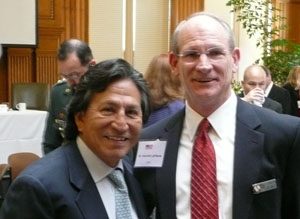

CHDS Deputy Director Kenneth LaPlante (R) with former Peruvian President Alejandro Toledo (L)
The Center for Hemispheric Defense Studies (CHDS), the Asia Pacific Center for Security Studies (APCSS), the Freeman Spogli Institute for International Studies (FSI) at Stanford University, and the Pacific Council on International Policy (PCIP) co-hosted a conference on “Pacific Rim Security – Managing the Global Commons” January 12-14, 2009 at Stanford University in Palo Alto, California.
The keynote address was given by the former US Secretary of Defense, Dr. William Perry. The event brought together 45 delegates from 17 nations: Australia, Canada, Chile, China (Hong Kong), Colombia, Ecuador, India, Indonesia, Malaysia, Mexico, Panama, Peru, Philippines, Republic of Korea, Singapore, United States, and Vietnam.
In presenting Dr. Perry to the group, CHDS Director Richard D. Downie noted that the Center’s participation was part of its on-going effort to contribute “to mutual understanding of the geographic expansion of the maritime domain in the Pacific Rim. “Our deliberations focus directly at the heart of our common security and prosperity,” Dr. Downie added.
The three-day conference provided a unique venue for senior government and non-governmental civilian and military leaders, security practitioners, and security studies experts from the Pacific Rim region to gain insights on the confluence of transnational security concerns linking Asia and Americas. It focused on the challenges faced by more than half the world’s population who live in the countries covered by three US combatant commands: the Pacific Command (PACOM), the Northern Command (NORTHCOM), and the Southern Command (SOUTHCOM).
Topics addressed, such as common regional threats and challenges, the changing infrastructure of maritime trade routes, maritime domain awareness, port and energy security, were meant to enhance the possibility of national security problem solving. The conferees exchanged views on issues such as the best ways of arriving at a mutual understanding of Pacific Rim regional policies, the importance of the creations of new and robust linkages between senior Pacific Rim leaders and the exploration of potential collaborative security strategies for managing the global commons.
Interactive question/answer periods and a lunch/dinner guest speaker series enabled participants to share unique insights and perspectives and sustain dialogue throughout the conference about those and other key issues.
CONTACT INFORMATION